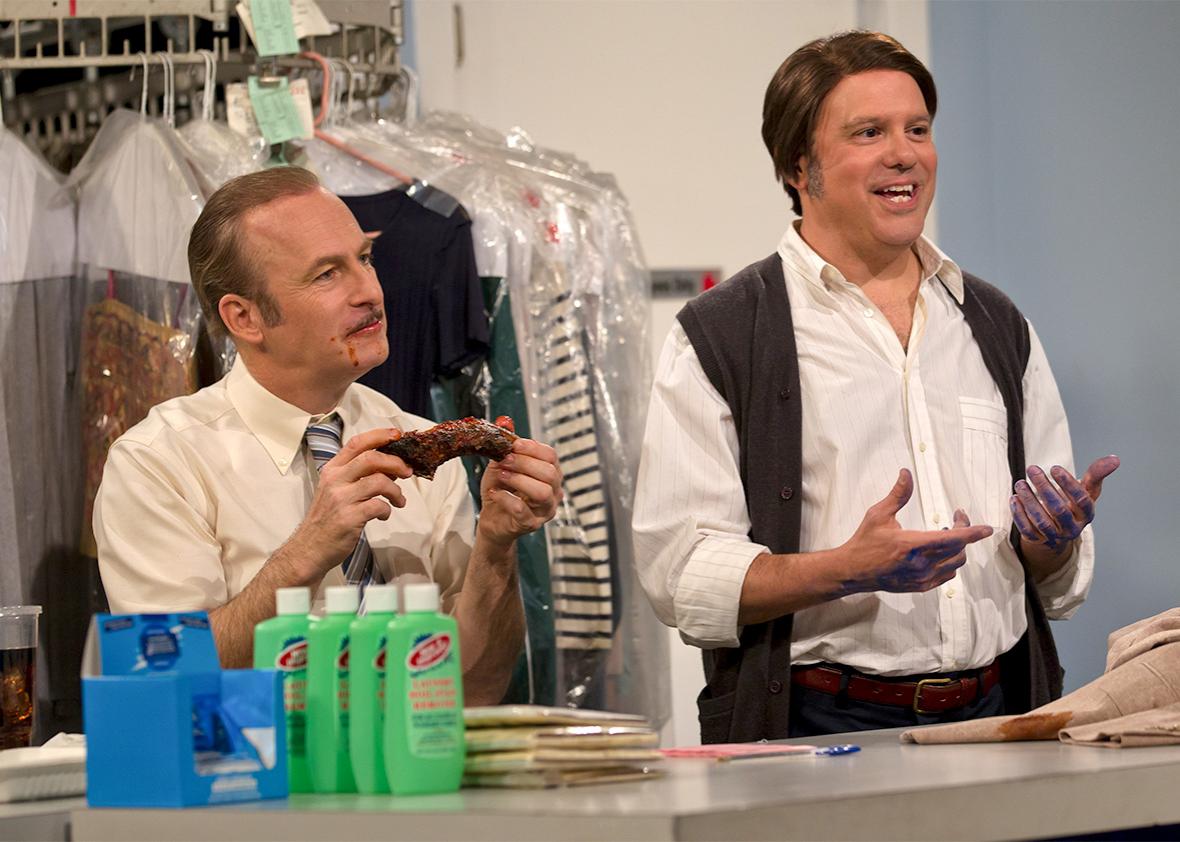Halfway into With Bob and David, the too-brief sketch reunion series that has just debuted on Netflix, there’s a clunker of a joke saved by who is telling it. A laundromat owner, played by Bob Odenkirk, is receiving an award for a musical about a house’s magical singing rooms. (This is not the clunker.) He unfolds his victory speech and says he doesn’t understand it.
“A proffure of the picment Mohaffed,” he says. It’s a callback to the episode’s establishing sketch, in which the Islamic radicals who actually run Hollywood warn that if they use even this mangled reference to “a picture of the prophet Mohammed,” the comedians will “meet 72 virgins.”
This is the clunker: Confetti falls from the ceiling, and Odenkirk and his co-host David Cross are surrounded not by nubile women but by unkempt, grinning nerds with annoying questions. “Are you and Bob ever going to get together and do something?” “Are you still friends?” “Bob, are you going to make more Breaking Bads?” “What about the Arrested Development movie?”
Virgins! Get it? You probably do, because the joke is so old it was used on Family Guy a decade ago. But in the hands of David Cross and Bob Odenkirk, all sorts of “bad” jokes are molded into meta-jokes. In this one, the nerds are members of the Birthday Boys, a comedy troupe mentored by Odenkirk, with their own IFC series that got better just as it was getting canceled.
The creators of Mr. Show, at least the best sketch series since Monty Python’s Flying Circus, are making fun of their legacy—maybe even stranger and wider-ranging than Pythons’. Just look at who from the original Mr. Show is back: Paul F. Tompkins and Scott Aukerman became the Jefferson and Madison of the comedy podcast boom. Dino Stamatopoulos graduated from this writer’s room to Community’s. Tom Kenney became the voice of Spongebob Squarepants. Jack Black’s Tenacious D broke through as a mini-series, broadcast right after the show. The Tim and Eric comedy empire, which Odenkirk also mentored, is visible here in a grotesque title sequence of morphing faces and twisted limbs.
Netflix’s ability to put supergroups back together, which brings to mind another Mr. Show sketch, is unquestioned. It summoned Bradley Cooper back from Oscar camp for Wet Hot American Summer; it’s about to inflict Fuller House on millennials who, like so many of us, mistake “things I grew up with” with “things that are good.”
With Bob and David stands apart in its self-awareness and lack of pomp. These four episodes don’t build on the Mr. Show legacy, or pick up threads, like the Wet Hot and Arrested Development resurrections did. There’s really only one callback to the HBO series, which ran between 1995 and 1999, and—no spoilers—it’s to a classic-yet-throwaway joke that neither Bob nor David were part of.
Instead, there’s a pretty good set of sketches that occasionally reach transcendence. Cross’s post–Mr. Show work has perfected the comedy of despair, from his Bush-era stand-up comedy to the defiantly incompetent Tobias Fünke and Todd Margaret. He blends the styles in these sketches, most memorably in a parody of the surprise YouTube genre of self-taught constitutionalists GoPro–ing their interactions with police. “You have a legal right to vomit!” says Cross’ freedom fighter into the camera, after finally goading a cop into making him throw up. “It’s your right!” This is ridiculously specific, but Mr. Show was there for the first round of this sort of libertarianism-for-jerks with its “Independent Nation Games.”
Odenkirk, whom younger viewers might only know as the Emmy-nominated Saul Goodman, is restored here to his position as the best yeller of swear words in comedy. A line like “These leads are shit!” is not inherently funny. But put in the mouth of Odenkirk’s desperate Arthur Miller–inspired Quran salesman, it’s a poem. Odenkirk masters multiple characters who could generously be described as terrible fathers, including one who briefly stops his child’s heart so he can write a version of his Heaven Is for Real–style memoir.
The supporting players—who tellingly appear onscreen before either Bob or David do—are often even better. In the original Mr. Show run, John Ennis stole sketch after sketch. One of the series’ best lines was his, as the frustrated GloboChem president who informs disrespectful ad men that “my great-great-great-grandfather started this company with one single rickety leaky handcrafted slave ship, and a simple motto: ‘People Selling People to People.’ ” Rescuing him from a series of hard cider commercials and restoring him to sketch comedy glory is an act of Netflix sainthood, if we assume that Citizens United allows faceless corporations to become saints.
The only thing missing is, well—more. As evidenced by those 72 virgins, some sketch comedy is written to avoid dating, but Mr. Show was a true document of its time. Watching the show these days, the sketches about a thinly disguised Bill Clinton and dopey senators and MTV and hidden-camera shows do not feel as much dated as definitive. The “blow up the moon” sketch, which ran years before the re-invasion of Iraq, somehow has become a timeless statement about jingoism. Country singers writing dopey jingles about the need to trust the government? Somehow, Mr. Show got there before Toby Keith did.
With Bob and David sometimes scales those heights. Who knew that the world needed an extended parody of Shingy, the fright-wigged “digital prophet” of AOL? Not me—not until Cross and Odenkirk traded places as multiple “Shangies,” spouting Web 2.0 gibberish in front of rich people who can’t tell them apart. The world needed this reunion, just like it needs Cross and Odenkirk and Tompkins et al. to scatter and tumble into as much pop culture as possible.
